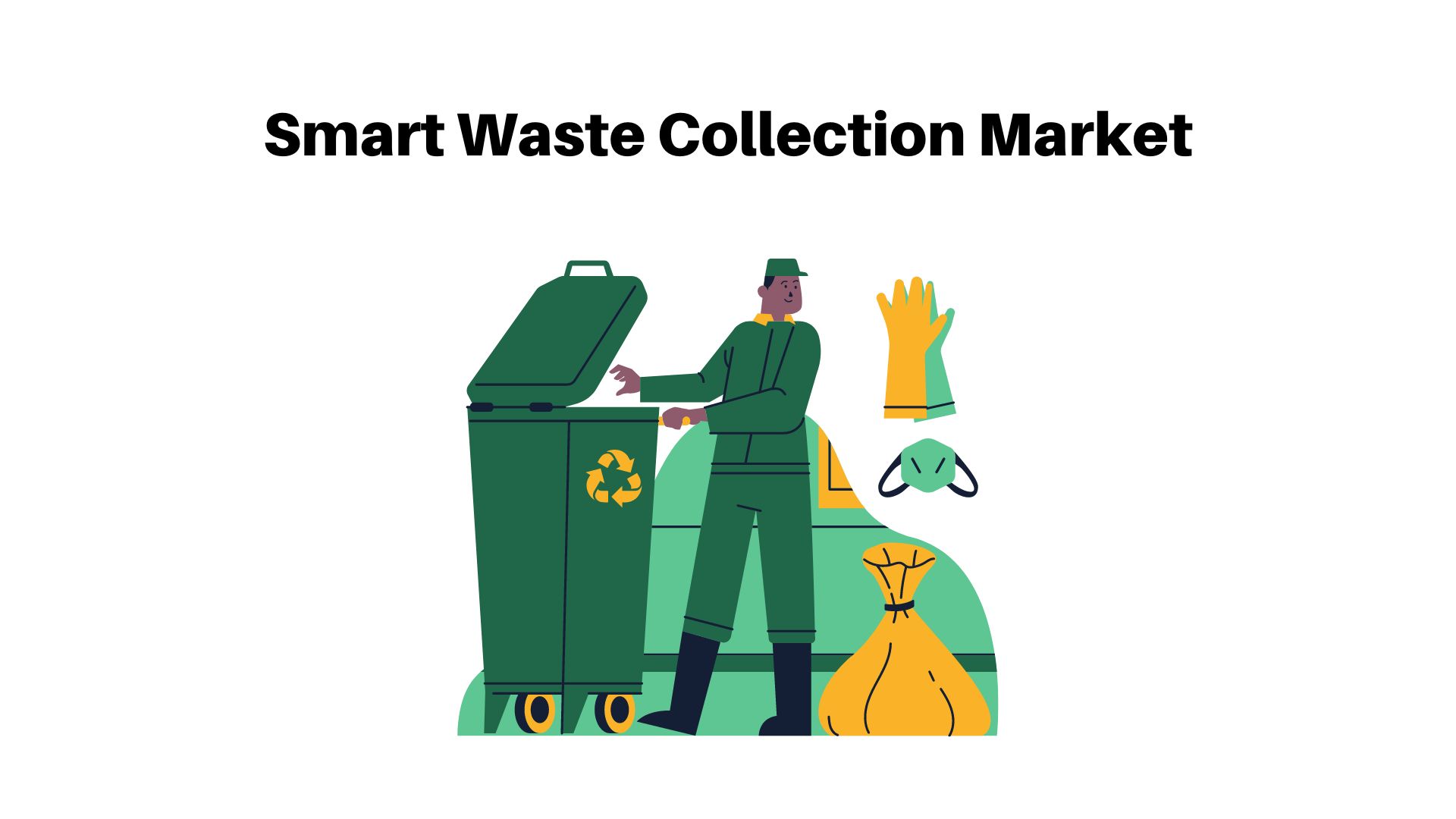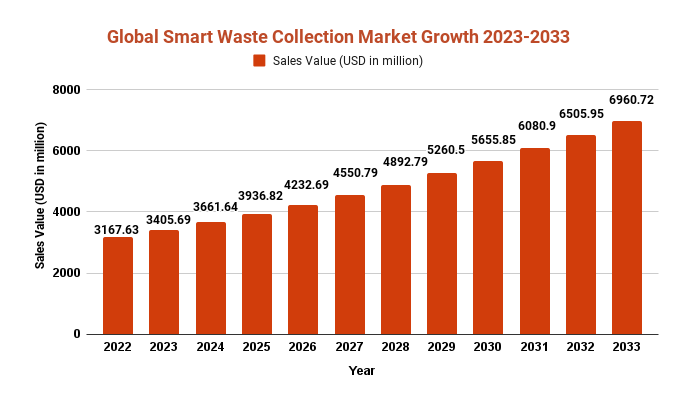Smart Waste Collection Market Will Hit USD 6960.72 Mn By 2033

Page Contents
Market Overview
Published Via 11Press: The smart waste collection industry utilizes technology to streamline the process of waste collection and management. It includes solutions such as smart bins, sensors, and software platforms that improve efficiency during collection, reduce costs, and minimize environmental impact due to waste production. The demand for sustainable solutions in waste management has become greater due to growing environmental worries and our planet's negative effects caused by human activity. With these growing concerns many governments and organizations are searching for more effective methods of managing their waste. Smart waste collection offers one opportunity to address these challenges head-on.
Global Smart Waste Collection market size is expected to be worth around USD 6960.72 Mn by 2033 from USD 3167.63 Mn in 2022, growing at a CAGR of 6.99% during the forecast period 2023 to 2033.
The industry has been revolutionized by technological advances such as the Internet of Things (IoT) and artificial intelligence (AI). These solutions enable waste management systems to collect data on volumes and types of waste generated, optimize collection routes, and enhance efficiency. Besides environmental benefits, smart waste collection solutions could potentially offer cost savings opportunities for companies and municipalities by optimizing operations while decreasing manual labor requirements. Ultimately, smart waste solutions help reduce operational expenses while increasing profitability.
Request For Sample Report Here: https://marketresearch.biz/report/smart-waste-collection-market/#inquiry

Key Takeaways
- The smart waste collection industry leverages technology to optimize its collection and management processes.
- Solutions such as smart waste bins, sensors and software platforms help improve waste collection efficiency, lower costs and minimize the environmental impact of disposal.
- The industry is being driven by an increase in demand for sustainable waste management solutions due to growing environmental concerns.
- Technological advances such as the Internet of Things and artificial intelligence are spurring growth within this industry.
- Smart waste collection solutions offer potential cost savings to waste management companies and municipalities by streamlining collection processes and eliminating manual labor requirements.
- The industry is predicted to experience continued expansion in the coming years due to rising demand, technological advances and potential cost-saving opportunities.
Regional Snapshot
- The North American smart waste collection market is the largest globally, driven by leading technology companies and an increased level of environmental awareness among consumers. The US and Canada are major contributors to market growth, and these two nations are expected to remain dominant over the coming years.
- The European smart waste collection market is expected to experience significant growth due to stringent environmental regulations in the region. Countries such as Germany, France and the UK are projected to lead market development due to increasing investments in smart city initiatives.
- Asia Pacific is expected to experience the fastest-growing smart waste collection market, due to rising population and urbanization. Furthermore, there have been significant government initiatives towards developing smart cities, which should encourage demand for such management solutions.
- The Latin American smart waste collection market is expected to experience growth over the coming years due to increasing government initiatives to improve waste management and growing consumer awareness about sustainable practices.
- The Middle East & Africa region is projected to experience moderate growth in the smart waste collection market, due to an increasing adoption of advanced technologies and government initiatives promoting sustainable waste management practices.
Drivers
With growing environmental concerns about waste management and sustainability, there is an increasing demand for solutions that minimize its environmental impact. Technologies like IoT, AI, and machine learning are enabling waste management systems to collect data on volumes and types of waste generated, optimize collection routes, and boost efficiency. Governments around the world are adopting policies and regulations designed to promote sustainable practices in waste management while reducing environmental damage – leading to an uptick in smart waste collection solutions.
Smart waste collection solutions offer potential cost savings to companies and municipalities by optimizing collection processes and eliminating manual labor requirements. As global population continues to rise and urbanization increases, so too does demand for smart waste management solutions in order to meet the demands of rapidly expanding cities. Furthermore, consumer awareness about waste's detrimental effect on the environment is growing, leading to an increasing interest in sustainable solutions that minimize its environmental effects.
Restraints
Implementing smart waste collection solutions entails substantial upfront costs, which may be a deterrent for some waste management companies and municipalities. Furthermore, the effectiveness of such solutions relies on infrastructure such as reliable wireless networks and adequate power supply; in certain regions this lack of infrastructure may prevent adoption of these technologies. Despite growing consumer awareness regarding waste's detrimental effect on the environment, there remains limited understanding about their advantages – making it challenging to drive demand for these services.
Smart waste collection solutions involve the collection and storage of sensitive data, raising concerns about data security and privacy. Regulations regarding waste management can differ significantly between regions, creating difficulties for companies trying to implement similar systems across various markets.
Opportunities
Emerging markets, particularly Asia and Latin America, present significant potential for smart waste collection solutions. The growing urbanization in these regions is driving demand for sustainable waste management practices and the adoption of smart technologies is on the rise. The growth of smart cities is creating a demand for intelligent waste collection solutions, as waste management plays an integral role in urban infrastructure. Companies within this market can benefit from partnerships and collaborations between waste management firms, technology providers, and municipalities to spur innovation and accelerate adoption of advanced waste collection systems.
The advancements in technology such as advanced sensors, AI and machine learning have the potential to create more efficient and effective waste management solutions. The shift towards a circular economy presents unique opportunities for smart waste collection solutions. By using data to understand waste streams better, companies can devise methods to recover, recycle and reuse it efficiently – decreasing landfill needs while minimizing its environmental impact.
Challenges
Due to a lack of standardization and compatibility among different smart waste collection systems, it can be challenging for waste management companies to adopt and integrate different solutions. Smaller firms may face particular obstacles when investing in such solutions due to the initial investment needed. Furthermore, implementing and maintaining such systems requires specialized knowledge and skillsets.
Smart waste collection solutions may be perceived as intrusive, with privacy and data security issues leading to concerns. Public perception of these solutions could hinder their adoption and growth. Regulations regarding waste management vary across regions, creating challenges for companies trying to implement these systems in different markets. Furthermore, some smart waste collection solutions may not be applicable in all waste management scenarios, which limits their potential uses cases.
Market Segmentation
Smart Waste Collection Market, by Component
- Hardware
- Software
Smart Waste Collection Market, by System
- Smart Waste Bin Collection System
- Smart Fleet Management & Logistic Solution
- Smart Waste Recycling System
- Cloud Computing (IoT) Interface
Smart Waste Collection Market, by Utility Type
- Public
- Private
Key Players
- Big Belly Solar, Inc,
- GreenQ
- IBM cloud functions
Report Scope
| Report Attribute | Details |
| Market size value in 2022 | USD 3167.63 Mn |
| Revenue forecast by 2033 | USD 6960.72 Mn |
| Growth Rate | CAGR Of 6.99% |
| Regions Covered | North America, Europe, Asia Pacific, Latin America, and Middle East & Africa, and Rest of the World |
| Historical Years | 2017-2022 |
| Base Year | 2022 |
| Estimated Year | 2023 |
| Short-Term Projection Year | 2028 |
| Long-Term Projected Year | 2033 |
Check Growing Demand => Purchase Market Report
Recent Developments
- CleanCUBE: CleanCUBE is a solar-powered waste bin that uses sensors to monitor fill levels and notify waste management teams when the bin needs emptying.
- Ecube Labs: Ecube Labs offers a suite of smart waste management solutions, such as solar-powered compacting bins and IoT sensors that monitor fill levels and temperature in waste containers.
- WasteHero: WasteHero is an intelligent waste management system that utilizes AI and machine learning to optimize collection routes, reduce waste production, and promote recycling and composting practices.
- Enevo: Enevo offers a suite of smart waste management solutions, such as sensors that monitor fill levels in containers and software designed to optimize collection schedules and routes.
Market Situation
- The COVID-19 pandemic has underscored the significance of effective waste management systems. Many waste management companies have implemented smart waste collection solutions to eliminate manual labor and boost efficiency. In 2021, several partnerships and collaborations in this space have been announced: Veolia and Microsoft will collaborate to develop a smart waste management system; Ecube Labs and Schneider Electric have joined forces to expand their smart waste collection offerings.
- Many companies in the smart waste collection market have expanded into emerging markets, particularly Asia and Latin America. For instance, Bigbelly – a leader in providing smart waste collection solutions – recently opened operations in India and Brazil. The adoption of cutting-edge technologies such as advanced sensors and AI is fueling innovation in the smart waste collection market. For instance, IBM has designed a system that utilizes AI to optimize collection routes. Many companies in the smart waste collection market are focusing on circular economy initiatives, using data to better understand waste streams and develop solutions for recycling or reuse. For instance, Rubicon Global recently launched a circular economy platform which connects waste generators with recycling and composting facilities.
Key Questions
What key drivers can be expected to shape the future?
With increasing awareness about the environmental consequences of waste production and an urgent need for sustainable waste management practices, there will likely be a continued focus on developing and adopting smart waste collection solutions.
What are the major challenges confronting the smart waste collection market?
For these solutions to work optimally, reliable infrastructure and connectivity is necessary; in certain regions these may not be available or reliable enough for full use, thus restricting their adoption as well as their effectiveness.
How are key technologies being applied to enhance waste management practices?
Smart sensors can be installed on bins to monitor their fill levels and optimize collection routes, cutting down on unnecessary trips and costs.
How is big data analytics driving the growth and adoption of smart waste collection solutions across different markets?
Data from waste management systems is being analyzed to provide more informed decision making, leading to improved practices in waste management.
How are smart waste collection solutions being integrated into a larger smart city initiative?
Smart waste collection systems can be linked with smart transportation systems, enabling vehicles to be tracked and optimized in real-time for improved efficiency and reduced traffic congestion.
What are the potential advantages of a more circular approach to waste management?
A circular approach prioritizes reuse, repair and recycling as a way of minimizing waste that ends up in landfills or incinerators. This reduces emissions that cause these problems.
The team behind market.us, marketresearch.biz, market.biz and more. Our purpose is to keep our customers ahead of the game with regard to the markets. They may fluctuate up or down, but we will help you to stay ahead of the curve in these market fluctuations. Our consistent growth and ability to deliver in-depth analyses and market insight has engaged genuine market players. They have faith in us to offer the data and information they require to make balanced and decisive marketing decisions.